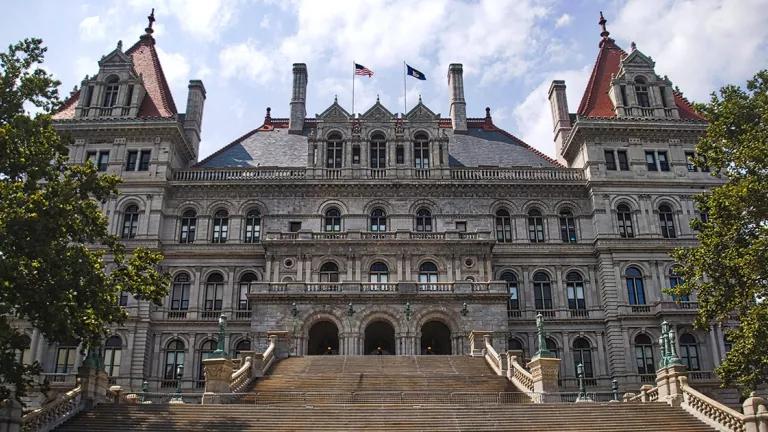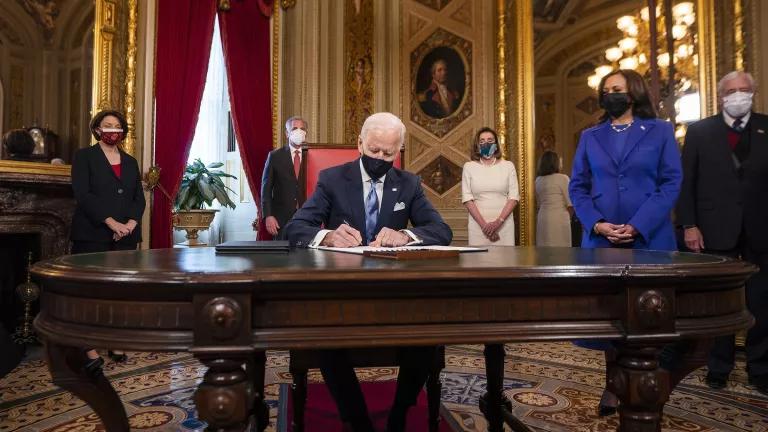Budget Gimmicks Plunder Public Lands, Taxpayer Pockets
The United States Senate passed its budget resolution yesterday, prying open the door to massive cuts to funding for critical public safeguards from food safety to protections for America’s public lands and oceans. Republican Leadership and its oil industry allies also narrowly defeated an amendment that would have rejected a budget gimmick that provides a blank check to the Senate and House Natural Resources Committees that puts the nation’s parks, wilderness areas, and publicly-owned ocean waters on the chopping block.
As I recently wrote, this budget provision instructs the Senate’s Energy and Natural Resources (ENR) Committee to identify $1 billion in revenue over 10 years from within its purview. It’s no secret that the push for this blank check came at the behest of ENR’s Chairwoman, Senator Lisa Murkowski (R-AK) in yet another attempt to put oil rigs in the middle of the pristine Arctic Wildlife Refuge and protected oceans from the Arctic to the Atlantic coasts. This backdoor attack on taxpayer pockets and public lands alike wouldn’t have the public support to pass if it weren’t being snuck into the larger budget and tax reform package.
Oil industry executives shouldn’t pop those Champagne corks just yet though.
It’s a long path from today’s misguided vote to final passage. Light has been cast on this spurious attempt to lock the public out of its public lands, revealing a wave of bipartisan opposition and fundamental flaws in the math.
Oil industry boosters have been pushing for decades to open the Arctic Refuge to drilling. They failed every time, a testament to the powerful opposition by the majority of Americans and bipartisan elected officials. The same holds true for our coastal waters, many of which are now protected from expanded offshore drilling as a result massive opposition from across the country to previous attempts to sink drill rigs off our coasts.
So what happens next?
Through a process known as budget reconciliation, Congress can pass laws that, in theory, align federal spending and revenue with the budget it previously decided on. It’s a potent tool, as a grand package of provisions can be advanced with a simple majority vote. And as we have seen before, Republican Leadership loves to lard up these ostensibly fiscal bills with policy riders that otherwise would fail on their merits.
Specifically, the next step will take place when the Senate Natural Resource and House Natural Resource Committees decide how to meet the “budget instructions” to raise revenue. Then the results will be stitched together with other committee bills and the House and Senate will vote on that giant package. Finally, the two houses will attempt to reconcile any differences between their bills, and then vote on the merged, final legislation.
That is a lot of arcane procedure. The point is that at every step of the way there is an opportunity for our elected officials to show whether they are loyal to oil, or the public interest.
There is no rationale to liquidate our public lands and oceans other than to deliver oil industry its wish list. Here is why:
- The public has made clear it wants less drilling, more safety, and fewer taxpayer giveaways to private oil companies. The public explicitly opposes using the budget to sell-off more public lands and oceans.
- Turning our public lands and oceans over to the oil and gas industry is like slaughtering the golden goose for a single meal. Once degraded, these lands and waters cannot sustain local economies—from tourism and commercial fishing, to recreational use like hunting and fishing—that depend on healthy environments. In contrast, intact public lands and healthy oceans are economic engines. For example, industries reliant on a healthy Atlantic ocean generate at least $55 billion a year and sustain over a million jobs—jobs that exist now and would be put at immediate risk from seismic exploration and drilling.
- There are many other ways to generate revenue that don’t sacrifice existing jobs, communities, and degrade our environment. For example, reducing the $8 billion in tax breaks and other subsidies the oil industry harvests from taxpayers every year.
- The math doesn’t pencil out. The amount of federal revenue promised from opening these areas to oil leasing is wildly exaggerated. Oil can’t flow from them for many years, likely decades. The logistical challenges of drilling for and delivering it means the entire endeavor is purely speculative. There is a reason major investment houses have called such high-cost, high risk projects “vanity projects”. Relying on such unstable projections is a recipe for increasing budget gaps and flies in the face of responsible fiscal management.
- The costs of expanded drilling in these high-risk areas is blatantly left out of the oil boosters math. For example, nearly 50 percent of new fossil fuel projects depend on taxpayer subsidies. That means new projects increase subsidies and lock in a cycle of federal handouts already a century old. Further, the public pays for the clean-up from inevitable oil spills, not to mention the mounting recovery costs from extreme weather events driven by burning fossil fuels.
- We don’t need to expand further into our remaining public lands for oil. The industry has stockpiled decades worth of reserves, many of which have been inactive for years. Locking up more public lands so the industry can pad its investment portfolio is not in the public interest.
- There are far safer sources of energy that don’t put existing economies and national treasures at risk. The nation needs renewable energy like solar and wind that creates jobs, not more oil industry handouts.
The bottom line is turning the budget process into a delivery mechanism for oil industry profits is not in the public interest, whether you focus on taxpayer pockets, environmental stewardship, or sound fiscal management.



